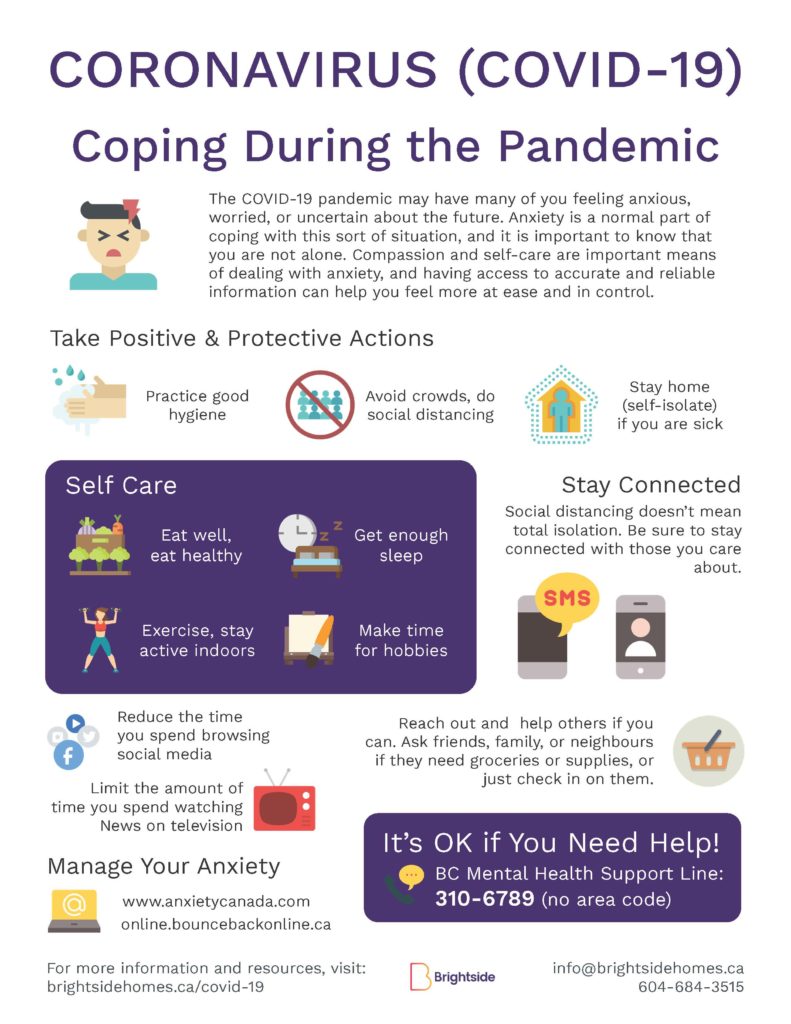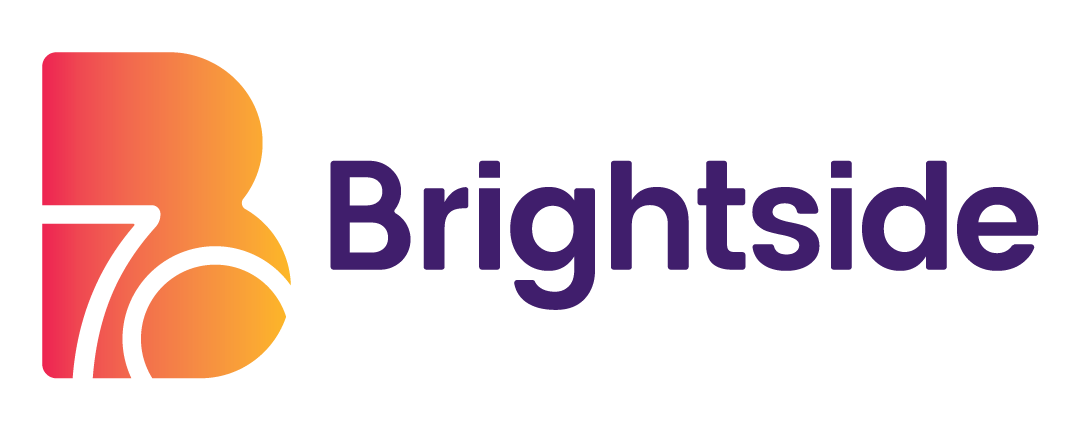
During these challenging and uncertain times, Brightside would like to extend support and provide its community with resources available to help folks get through this time.
Above is an infographic that provides a brief overview of the information below. The information below was provided by the Canadian Mental Health Association and can be found on their website (www.cmha.bc.ca).
Anxiety is a normal reaction to uncertainty and things that may harm us. It’s important to be kind to yourself. This is an anxious and stressful time for everyone. It’s okay if you feel more anxious than usual, and it’s okay to take time for yourself to manage your mental health. You are doing the best you can in a time when simply turning on the news can feel overwhelming.
While anxiety is a normal and expected reaction to the pandemic, too much anxiety can start to cause harm. Feeling stressed and fearful every day takes a toll on health and well-being very quickly. When anxiety and fear lead to panic, people may also take precautions that ultimately cause disruptions, like demanding a lot of tests or medical care when it isn’t necessary or stockpiling certain supplies to the point that those supplies aren’t available to people who are sick and need those items.
Anxiety can also cause the opposite reaction: denial or refusing to believe that the situation is serious. Denial is unhelpful. When people deny the severity of a situation in order to avoid anxiety, they may do nothing, even ignoring recommendations from health authorities.
A better place is somewhere in the middle. Coronavirus and the COVID-19 illness are serious and we should be concerned about the situation, but they are not catastrophic disasters. You can use that concern to take positive and protective actions—things like practicing good hygiene, staying home when you feel sick, and having a plan in case you need to self-isolate.
What can I do about coronavirus and the COVID-19 illness?
Act to maintain/improve your personal well-being by…
- Looking for information from trusted and reputable sources like BC Centre for Disease Control, the Government of Canada, and the World Health Organization. They will have reliable information about how to reduce your risk of getting sick or passing the illness on to others.
- Eating as well as possible.Try to still consume food that contain all the food groups and do your best to keep up your fruit and veggie intake!
- Exercising regularly. While access to exercise aids may be limited, try to stretch and move your body as much as you can. There are online resources available with guided classes on YouTube. If you have access to a computer/smart phone/tablet search up ‘national institute on aging go4life’ or ‘exercises for seniors’ to access these classes.
- Making sure you get enough rest. While it is recommended that you get between 7.5 – 9 hours of sleep, what is most important is assessing how you feel in the morning and whether your body feels that it is need of more sleep during the day.
- Trying out new indoor activities. Maybe try to develop a hobby or learn something new. There are many tutorials/classes online depending on what you are looking for.
- Staying connected with family and friends. While it is important to practice social distancing and refrain from touching, hugging, handshakes, and any direct physical contact, it is crucial to stay connected. Reach out to your friends, family and neighbours for support via phone or through online platforms.
- Limiting the amount of time you spend watching the news and engaging with social media. It is crucial that we stay informed during this time, but constantly checking for updates or reading sensationalized stories can really take a toll on your mental health.
- Trying different self-management strategies. Perhaps try yoga, meditation, art, or practice mindfulness to manage anxious thoughts. You can find self-management strategies for anxiety from Anxiety Canada at www.anxietycanada.com
- Prepare supplies. It’s hard to predict exactly what will happen next, but preparing for situations like self-isolation can help reduce some uncertainty about the future. BC residents are advised to keep two weeks of supplies at home in case they have to quarantine themselves. This includes food, household products, prescription medications, over-the-counter medications, and supplements.
- Have a personal care plan. Talk to your support system, whether it be family, friends, neighbours, doctors, counselors, or all other care workers. Let them know how you are doing and make sure that someone is checking in with you regularly (just not face-to-face)
- Seek extra help or support when you need it. People feel anxious about the future at the best of times, and many people have never encountered a pandemic like this before. It’s okay if you need help.
Here are some signs you might benefit from extra help and support:
- You can’t think about anything other than coronavirus or the COVID-19 illness
- Your anxiety interferes in your daily life—for example, you have a hard time engaging in other activities throughout your day
- You feel hopeless or angry about the situation
- You have a hard time eating or sleeping well
- You experience physical symptoms like frequent headaches or an upset stomach
If you need more information about local services or you just need someone supportive to talk to, call the BC Mental Health Support Line at 310-6789 (no area code) at any time.
The COVID-19 illness situation changes often, so see the following links for up-to-date information on protecting yourself and staying safe:
- BC Centre for Disease Control — www.bccdc.ca
- Government of Canada — www.canada.ca/coronavirus and the COVID-19 Information Line at 1-833-784-4397
- World Health Organization — www.who.int/health-topics/coronavirus
